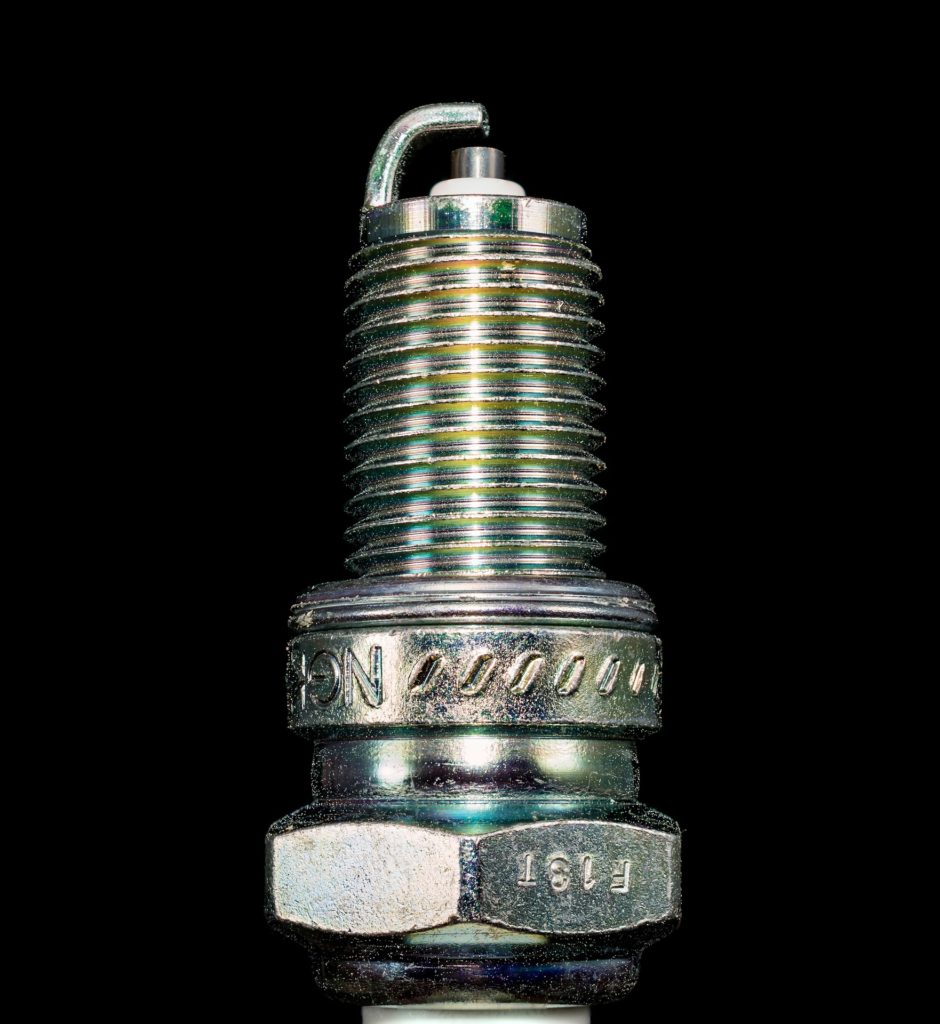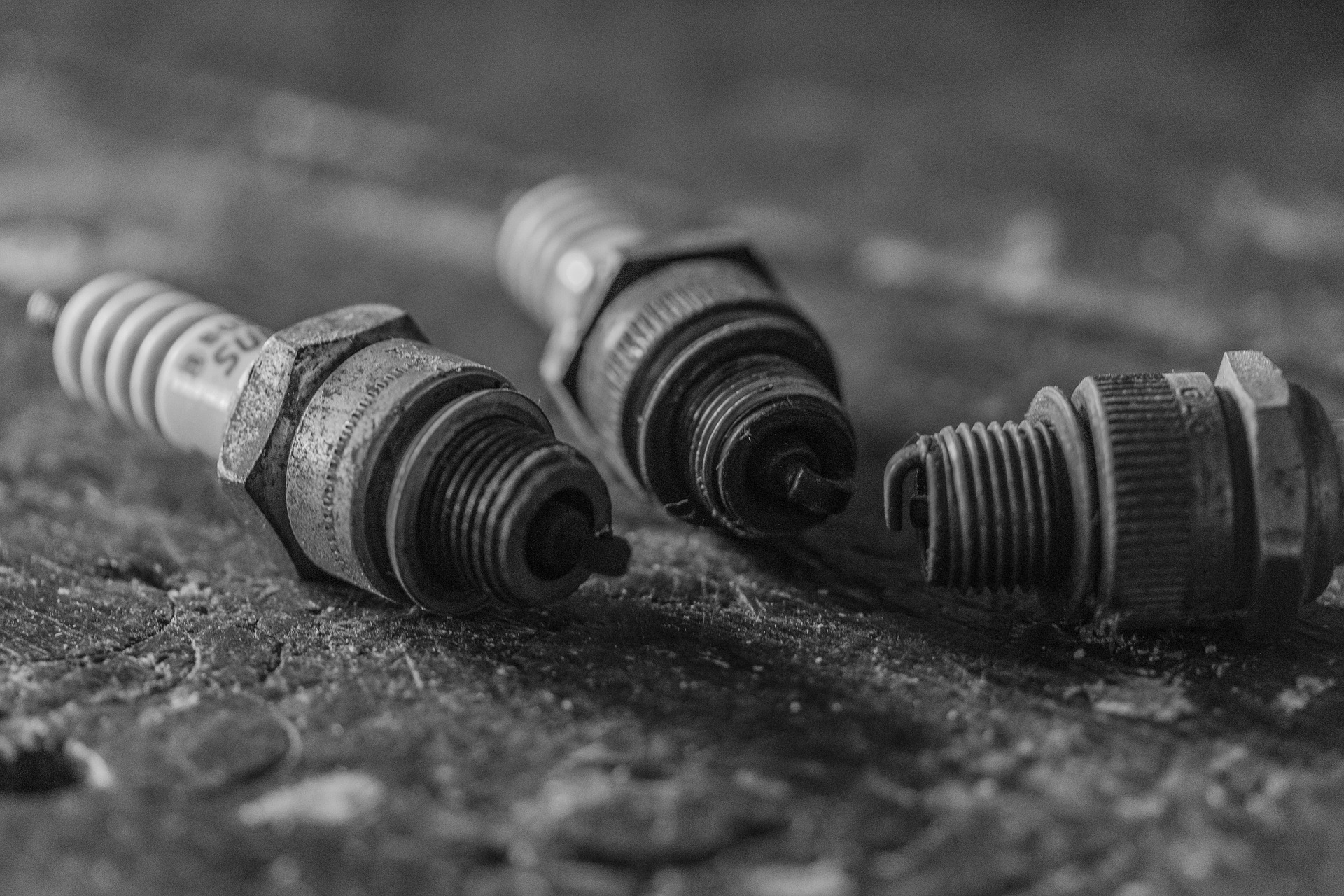Have you ever stood at the auto parts counter, trying to buy some spark plugs, and been asked, “What type of spark plug do you want.” And all you can do is think is, there is more than one type??? You reply, “Just give me the best one you have.” With this Spark Plug Buyers Guide, we will answer your questions and dive into three common types of spark plugs in the automotive industry: standard copper core, platinum, and iridium spark plugs. We will explore the pros and cons of each and examine reasons you may not want to buy the “best” spark plug on the market. Let’s dig in!
Basic Spark Plug Construction
There are four major components of a spark plug, so let’s start with a basic rundown of how a spark plug is constructed. If you would like a little deeper look at a spark plug click here.
Terminal
Our spark, which originated at the distributor and shot down the spark plug wire, now needs somewhere to go. In comes the terminal, the connection point from the wire to the rest of the plugs internal wiring. As our spark crosses through the terminal, it will hurry through the rest of the plug towards the electrodes.
Insulator
In comes our ceramic insulator to contain our spark within the plug and keep it from trying to run off to the engine block before we are ready for the action. A series of molded ribs, line the top of the insulator and seal our spark plug wire boot to the plug ensuring our spark doesn’t get any bright ideas about detouring through the boot.
Metal Shell
To keep our spark moving to the electrodes, we will need a metal shell to create a ground for the electrodes. The shell will provide a hex for loosening and tightening the spark plug, threads to screw it into the head, a seat to seal the chamber, and provide a ground, or path, for our spark to move.
Electrodes
This is where the magic takes place!

Our spark will complete its mission to ignite our fuel and power our motor. Here you will find the ground and central electrodes where our spark will have to jump from the central electrode to the ground electrode.
Jumping between the electrodes causes our spark to eat away at the electrodes, so we use a nickel alloy to prevent degradation. This is where we can use platinum or iridium to prevent our spark from degrading the plug and making it harder to jump electrodes.
Types of Plugs
All three types of plugs, standard, platinum, and iridium, all use the same basic constructions. The differences occur at the central and ground electrodes.
Standard Spark Plugs
The first is a standard nickel alloy set of electrodes. The central electrode caps a copper core while the ground electrode is welded to the shell and sticks out over the central electrode. This creates a gap where our spark arcs across electrodes. Manufactures add no extra plating to prevent wear to the electrodes, making them the cheapest and most common plugs.
Platinum and Double Platinum
Our spark is a classy fella and likes a nice little bit of platinum, just like your significant other!
To make a platinum spark plug, the manufacturer welds a small bit of platinum to the end of the central electrode, creating a highly wear-resistant patch for extended life and a small performance boost. If a little bit of platinum was good on one electrode, why not both? Now we have a double platinum plug.
Iridium
I guess our spark is never satisfied, we discovered a material that she likes even more! Remember that rare metal Loki steals in the first Avengers to create his portal, yea, that’s what we are talking about here. Iridium is over 10x less abundant than platinum!
This makes iridium, the most expensive plug on the market. Iridium’s increased wear resistance and an increased melting point will provide about 25% more life compared to its platinum counterparts. Our spark likes this material so much more, that she gives us an extra kick in the pants and some increased performance, which may give you all the reason you need to run out and spend the extra money on this plug.
Notable
A few arrangements of electrodes differ from the standard construction.
Which spark plug is right for me?
Never Downgrade
We don’t want an unhappy spark in our life so always use the minimum recommended spark plug for your vehicle. Never downgrade, if your vehicle recommends iridium spark plugs, use iridium spark plugs. The manufacturer designed your engine around the OEM plug, and our spark will struggle to jump the electrode gap if we downgrade. This could cause decreased fuel mileage, poor timing, and misfires. While the computer compensates for all the issues, it will push the electrical system harder in order to make the spark jump the gap. As the system works harder, we decrease the life span of our components, costing us more money and more time under the hood.
Cost
Despite our spark’s love of precious metals, they come at a cost. I have seen iridium’s going for a similar cost as platinum but this is an exception and not the rule. If you find iridium for the same cost, it would be smart to get the 25% extra life from them and our spark will love you for it.
A word of note, if you don’t plan on keeping your vehicle, I suggest only putting in plugs that will last the mileage you plan to keep the vehicle.
Let’s do some quick math to compare the numbers. I will make a few assumptions. Standard spark plugs will last about 20,000 miles and double platinum’s about 3 times that, so 60,000 miles. Assuming iridium’s will last 25% longer, we will put them at 75,000. Advertising will show better mileage, but I would rather be conservative on the math.
We will also use the cheapest plugs I could find for each on autozone.com.
- Standard = $2.09
- Double Platinum = $5.49
- Iridium = $7.49
Formula
Miles Per Dollar(MPD) = Miles/Cost
Results
- Double Platinum = 10929 MPD
- Iridium = 10013 MPD
- Standard = 9569 MPD
This is the result I was expecting. Iridium is too rare of a metal to compete with a platinum plug but will still outperform a standard plug.
Remember, my basic calculations make a lot of assumptions. You may find that iridium plugs are the same price as platinum plugs. Or you might even pull off 120,000 miles on a set of iridium plugs. The formula above will let you do your own math in the store. Make informed decisions, that is what this is all about. I want to help you get the most out of our your spark!
Convenience
Let’s not forget, none of us want to be under the hood constantly. I worked on a couple cars that had me send a wrench careening across a shop floor! One had the plugs facing the firewall and I could barely get the tips of my fingers on the plugs. Yea, I never want to change those spark plugs a second time! Install the best plug and forget about them. We will be happy, our spark will be happy, and our tools will be happy.
Don’t forget to take into account how long you plan to keep the car. If your car is being put to pasture in 20,000 miles, install the cheap plugs and save some money, even if they are a pain to change.
Performance
The best performance will come from iridium spark plugs, our spark just likes them more, followed by platinum, and then standard. Remember your plugs will wear out over time and you will see a drop-off. Longer lasting plugs can cause us to become like the toad in boiling water. You neglected the spark plugs and suddenly grandmas Oldsmobile is beating you on the drag strip. Ok, most of us aren’t running on a drag strip, but decreased performance means increased fuel consumption and increased cash going into the pump…
Abundance
Our spark is a hungry little guy! Is it worth using precious metals on consumable just to feed him?

Iridium is a rare earth metal, even when compared to platinum. I would argue that the small benefit you can get from an iridium plug isn’t worth its use. Maybe we will need iridium to power the reactors of the future.
That said, if the numbers work out, go ahead and pick some up. They are the best plugs on the market! Plus, you can say you have iridium spark plugs. I know it’s fun!
If you are looking for increased performance while still using a standard nickel alloy plug, I found one alternative. E3 Spark Plugs are used extensively in racing applications and make a wide range of plugs for most engine applications.
Does Brand Matter?
Of the research I have done, limited information exists that one brand is far superior to another. Most brands use very similar construction and thus have similar results. I have always preferred NGK, but I have no reason for that conclusion.
It’s like the Chevy vs. Ford vs. Dodge scenario. Is one truly better than the other? Well, of course, Chevy’s are! Honestly, buy a name brand and focus more on what type of plug you are getting; your spark won’t care.
Having said that, I have been doing some research into E3 spark plugs. From what I’ve seen, they designed their plugs for a faster and more complete burn. The next performance build I do, I will try a set out! Until then, I can only recommend them based on YouTube videos I have watched.
Thanks for reading to the end of my Spark Plug Buyers Guide! I appreciate your support and ask that you subscribe if you like the content. As always, feel free to leave constructive comments, feedback is always welcome!
I hope you have a great day and keep learning!


